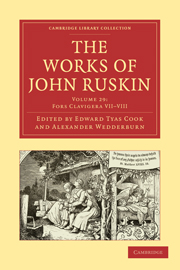Book contents
- Frontmatter
- Contents
- LIST OF ILLUSTRATIONS
- INTRODUCTION TO THIS VOLUME
- BIBLIOGRAPHICAL NOTE
- “FORS CLAVIGERA”: VOLUME VII. (1877): LETTERS 73–84
- “FORS CLAVIGERA”: VOLUME VIII. (1878–1884): LETTERS 85–96
- SYNOPSIS OF LETTERS 85–96
- LETTER 85 UNIQUE DOGMATISM (January, 1878)
- LETTER 86 LET US (ALL) EAT AND DRINK (February, 1878)
- LETTER 87 THE SNOW-MANGER (March, 1878)
- LETTER 88 THE CONVENTS OF ST. QUENTIN (March, 1880)
- LETTER 89 WHOSE FAULT IS IT? TO THE TRADES UNIONS OF ENGLAND (September, 1880)
- LETTER 90 LOST JEWELS (May, 1883)
- LETTER 91 DUST OF GOLD (September, 1883)
- LETTER 92 ASHESTIEL (November, 1883)
- LETTER 93 INVOCATION (Christmas, 1883)
- LETTER 94 RETROSPECT (March, 1884)
- LETTER 95 FORS INFANTIÆ (October, 1884)
- LETTER 96 (TERMINAL). ROSY VALE (Christmas, 1884)
- APPENDIX: ADDITIONAL PASSAGES FROM THE MANUSCRIPT OF, AND LETTERS RELATING TO, “FORS CLAVIGERA”
- INDEX
- Plate section
LETTER 96 - (TERMINAL). ROSY VALE (Christmas, 1884)
Published online by Cambridge University Press: 07 September 2011
- Frontmatter
- Contents
- LIST OF ILLUSTRATIONS
- INTRODUCTION TO THIS VOLUME
- BIBLIOGRAPHICAL NOTE
- “FORS CLAVIGERA”: VOLUME VII. (1877): LETTERS 73–84
- “FORS CLAVIGERA”: VOLUME VIII. (1878–1884): LETTERS 85–96
- SYNOPSIS OF LETTERS 85–96
- LETTER 85 UNIQUE DOGMATISM (January, 1878)
- LETTER 86 LET US (ALL) EAT AND DRINK (February, 1878)
- LETTER 87 THE SNOW-MANGER (March, 1878)
- LETTER 88 THE CONVENTS OF ST. QUENTIN (March, 1880)
- LETTER 89 WHOSE FAULT IS IT? TO THE TRADES UNIONS OF ENGLAND (September, 1880)
- LETTER 90 LOST JEWELS (May, 1883)
- LETTER 91 DUST OF GOLD (September, 1883)
- LETTER 92 ASHESTIEL (November, 1883)
- LETTER 93 INVOCATION (Christmas, 1883)
- LETTER 94 RETROSPECT (March, 1884)
- LETTER 95 FORS INFANTIÆ (October, 1884)
- LETTER 96 (TERMINAL). ROSY VALE (Christmas, 1884)
- APPENDIX: ADDITIONAL PASSAGES FROM THE MANUSCRIPT OF, AND LETTERS RELATING TO, “FORS CLAVIGERA”
- INDEX
- Plate section
Summary
1. “St. David, having built a monastery near Menevia, which is from him since called St. David's, in a place called the Rosy Valley (Vallis Rosina), gave this strict rule of monastical profession,—‘That every monk should labour daily with his hands for the common good of the Monastery, according to the Apostle's saying, He that doth not labour, let him not eat. For those who spend their time in idleness debase their minds, which become unstable, and bring forth impure thoughts, which restlessly disquiet them’ The monks there refused all gifts or possessions offered by unjust men; they detested riches; they had no care to ease their labour by the use of oxen or other cattle, for every one was instead of riches and oxen to himself and his brethren. They never conversed together by talking but when necessity required, but each one performed the labour enjoined him, joining thereto prayer, or holy meditations on Divine things: and having finished their country work, they returned to their monastery, where they spent the remainder of the day, till the evening, in reading or writing. In the evening, at the sounding of a bell, they all left their work and immediately repaired to the church, where they remained till the stars appeared, and then went all together to their refection, eating sparingly and not to satiety, for any excess in eating, though it be only of bread, occasions luxury. Their food was bread with roots or herbs, seasoned with salt, and their thirst they quenched with a mixture of water and milk. Supper being ended, they continued about three hours in watching, prayers, and genuflexions.
- Type
- Chapter
- Information
- The Works of John Ruskin , pp. 517 - 528Publisher: Cambridge University PressPrint publication year: 2010First published in: 1907

